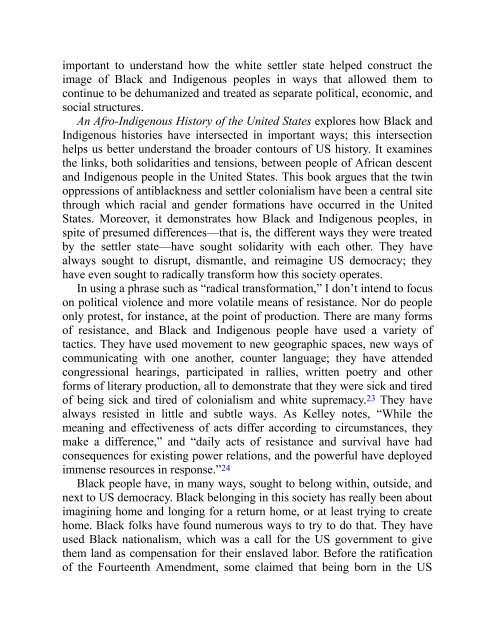Create successful ePaper yourself
Turn your PDF publications into a flip-book with our unique Google optimized e-Paper software.
important to understand how <strong>the</strong> white settler state helped construct <strong>the</strong><br />
image <strong>of</strong> Black and <strong>Indigenous</strong> peoples in ways that allowed <strong>the</strong>m to<br />
continue to be dehumanized and treated as separate political, economic, and<br />
social structures.<br />
<strong>An</strong> <strong>Afro</strong>-<strong>Indigenous</strong> <strong>History</strong> <strong>of</strong> <strong>the</strong> <strong>United</strong> <strong>States</strong> explores how Black and<br />
<strong>Indigenous</strong> histories have intersected in important ways; this intersection<br />
helps us better understand <strong>the</strong> broader contours <strong>of</strong> US history. It examines<br />
<strong>the</strong> links, both solidarities and tensions, between people <strong>of</strong> African descent<br />
and <strong>Indigenous</strong> people in <strong>the</strong> <strong>United</strong> <strong>States</strong>. This book argues that <strong>the</strong> twin<br />
oppressions <strong>of</strong> antiblackness and settler colonialism have been a central site<br />
through which racial and gender formations have occurred in <strong>the</strong> <strong>United</strong><br />
<strong>States</strong>. Moreover, it demonstrates how Black and <strong>Indigenous</strong> peoples, in<br />
spite <strong>of</strong> presumed differences—that is, <strong>the</strong> different ways <strong>the</strong>y were treated<br />
by <strong>the</strong> settler state—have sought solidarity with each o<strong>the</strong>r. They have<br />
always sought to disrupt, dismantle, and reimagine US democracy; <strong>the</strong>y<br />
have even sought to radically transform how this society operates.<br />
In using a phrase such as “radical transformation,” I don’t intend to focus<br />
on political violence and more volatile means <strong>of</strong> resistance. Nor do people<br />
only protest, for instance, at <strong>the</strong> point <strong>of</strong> production. There are many forms<br />
<strong>of</strong> resistance, and Black and <strong>Indigenous</strong> people have used a variety <strong>of</strong><br />
tactics. They have used movement to new geographic spaces, new ways <strong>of</strong><br />
communicating with one ano<strong>the</strong>r, counter language; <strong>the</strong>y have attended<br />
congressional hearings, participated in rallies, written poetry and o<strong>the</strong>r<br />
forms <strong>of</strong> literary production, all to demonstrate that <strong>the</strong>y were sick and tired<br />
<strong>of</strong> being sick and tired <strong>of</strong> colonialism and white supremacy. 23 They have<br />
always resisted in little and subtle ways. As Kelley notes, “While <strong>the</strong><br />
meaning and effectiveness <strong>of</strong> acts differ according to circumstances, <strong>the</strong>y<br />
make a difference,” and “daily acts <strong>of</strong> resistance and survival have had<br />
consequences for existing power relations, and <strong>the</strong> powerful have deployed<br />
immense resources in response.” 24<br />
Black people have, in many ways, sought to belong within, outside, and<br />
next to US democracy. Black belonging in this society has really been about<br />
imagining home and longing for a return home, or at least trying to create<br />
home. Black folks have found numerous ways to try to do that. They have<br />
used Black nationalism, which was a call for <strong>the</strong> US government to give<br />
<strong>the</strong>m land as compensation for <strong>the</strong>ir enslaved labor. Before <strong>the</strong> ratification<br />
<strong>of</strong> <strong>the</strong> Fourteenth Amendment, some claimed that being born in <strong>the</strong> US


















